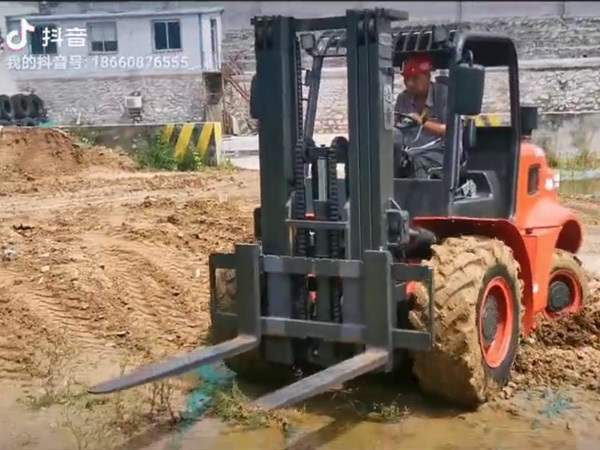Diken news
The Future of Farming: All Terrain Forklifts and Their Impact on Agriculture
Release time: 2025-08-21
The Future of Farming: All Terrain Forklifts and Their Impact on Agriculture
As the agriculture industry continues to evolve, the introduction of advanced machinery has become crucial for meeting the demands of a growing population. One such innovation making waves is the all terrain forklift. These versatile machines, designed for various agricultural environments, are reshaping how farmers operate their businesses. In this article, we will explore the impact of all terrain forklifts on farming, their advantages, and what the future holds for this essential piece of machinery.
Table of Contents
- Understanding All Terrain Forklifts
- Key Features of All Terrain Forklifts
- The Advantages of Using All Terrain Forklifts in Agriculture
- Enhancing Farming Efficiency with All Terrain Forklifts
- Sustainability and Environmental Impact
- Future Trends in Agricultural Machinery
- Case Studies of All Terrain Forklifts in Agriculture
- Frequently Asked Questions
Understanding All Terrain Forklifts
All terrain forklifts are specialized vehicles designed to operate in challenging environments, including rough and uneven terrains common in agricultural settings. Unlike standard forklifts, these machines boast enhanced stability, maneuverability, and traction, allowing them to perform efficiently in diverse conditions. With features like four-wheel drive and larger tires, they can navigate muddy fields, rocky landscapes, and inclines, making them indispensable for modern farming operations.
Key Features of All Terrain Forklifts
Several key features set all terrain forklifts apart from traditional models, enhancing their functionality in agricultural applications. These features include:
1. Four-Wheel Drive (4WD)
The four-wheel drive system provides excellent traction and control in slippery or uneven terrains, ensuring that the forklift can operate in virtually any field condition.
2. Heavy-Duty Tires
All terrain forklifts are equipped with robust tires that offer superior grip and durability, minimizing the risk of punctures or damage while traversing uneven surfaces.
3. Enhanced Lifting Capacity
These forklifts typically have a higher lifting capacity compared to standard models, allowing farmers to handle larger loads efficiently and safely.
4. Versatile Attachments
Farmers can use various attachments with all terrain forklifts, from forks to buckets, enhancing their versatility for different farming tasks such as loading, unloading, and transporting materials.
The Advantages of Using All Terrain Forklifts in Agriculture
Integrating all terrain forklifts into agricultural operations offers numerous advantages, significantly impacting productivity and efficiency:
1. Increased Productivity
By enabling farmers to transport materials quickly across challenging terrains, all terrain forklifts can drastically reduce the time spent on manual labor. This increased productivity translates into more efficient farm operations.
2. Reduced Labor Costs
With the ability to perform tasks that would typically require multiple workers, all terrain forklifts can help reduce labor costs. Farmers can achieve more with fewer employees, optimizing their workforce.
3. Improved Safety
Safety is paramount in agricultural operations. All terrain forklifts are designed with advanced safety features, such as stability control systems and ergonomic controls, reducing the risk of accidents and injuries.
4. Enhanced Accessibility
These forklifts can access remote or hard-to-reach areas of farmland, making it easier for farmers to manage their operations effectively, even in challenging locations.
Enhancing Farming Efficiency with All Terrain Forklifts
The efficiency brought by all terrain forklifts extends beyond simple transport: they can streamline various agricultural processes:
1. Streamlined Harvesting
During harvest season, all terrain forklifts can quickly transport harvested crops from the fields to storage areas. This reduces the time crops spend in the field, minimizing spoilage.
2. Efficient Material Handling
From transporting seed and fertilizer to moving heavy equipment, all terrain forklifts enhance material handling, making it easier for farmers to manage supplies and resources effectively.
3. Facilitating Irrigation and Maintenance
Farmers can use all terrain forklifts to access irrigation systems and perform maintenance tasks, ensuring that water supply is consistent and efficient throughout the farm.
Sustainability and Environmental Impact
Modern agriculture faces increasing scrutiny over its environmental impact. All terrain forklifts can contribute positively to sustainability efforts in several ways:
1. Fuel Efficiency
Many contemporary all terrain forklifts are designed with fuel-efficient engines, reducing greenhouse gas emissions associated with agricultural machinery.
2. Minimizing Soil Compaction
With their specialized tires and weight distribution, all terrain forklifts help minimize soil compaction compared to traditional tractors, promoting healthier soil conditions for crop growth.
3. Supporting Sustainable Practices
Farmers can use all terrain forklifts to implement sustainable practices, such as no-till farming and efficient crop rotation, contributing to long-term environmental health.
Future Trends in Agricultural Machinery
The future of farming is poised for exciting advancements, particularly concerning all terrain forklifts:
1. Integration of Smart Technology
Expect to see more all terrain forklifts incorporating smart technology, such as GPS and IoT, enhancing tracking, monitoring, and automated functions.
2. Electric and Hybrid Options
As sustainability becomes a priority, manufacturers may develop electric and hybrid all terrain forklifts, reducing reliance on traditional fuel sources.
3. Enhanced Customization
Future models may offer greater customization options, allowing farmers to tailor their equipment to specific needs, enhancing efficiency and productivity even further.
Case Studies of All Terrain Forklifts in Agriculture
Real-world applications demonstrate the impact of all terrain forklifts in various agricultural settings:
1. Crop Transport in Hilly Regions
A farm located in a hilly region adopted all terrain forklifts to manage crop transport. The forklifts allowed them to efficiently move harvested crops from steep areas to processing facilities, significantly reducing spoilage and labor costs.
2. Efficient Material Handling in Greenhouses
A greenhouse operation utilized all terrain forklifts to streamline the movement of soil, plants, and equipment. The forklifts enabled quick and safe transport, leading to a 30% increase in operational efficiency.
3. Disaster Recovery in Flooded Areas
After severe flooding, a farm used all terrain forklifts to clear debris and restore access to flooded fields. Their capability to navigate wet and unstable soil facilitated a faster recovery process.
Frequently Asked Questions
1. What types of terrain can all terrain forklifts handle?
All terrain forklifts are designed to operate on a variety of surfaces, including mud, gravel, grass, and uneven ground, making them ideal for agricultural settings.
2. Are all terrain forklifts fuel-efficient?
Many modern all terrain forklifts are designed with fuel efficiency in mind, utilizing advanced engines that reduce fuel consumption compared to older models.
3. Do all terrain forklifts require special maintenance?
While general maintenance practices apply, all terrain forklifts may need additional care for their tires and suspension systems due to the challenging work environments they operate in.
4. Can all terrain forklifts be used for low-temperature operations?
Yes, many all terrain forklifts are designed to function effectively in low-temperature environments, maintaining performance in cold weather conditions.
5. How do I choose the right all terrain forklift for my farm?
Consider factors such as lifting capacity, tire type, and specific operational needs when selecting an all terrain forklift to ensure it meets your requirements.
Conclusion
The evolution of agriculture is fundamentally tied to the advancements in machinery, with all terrain forklifts standing out as a transformative force in the industry. Their ability to enhance productivity, improve efficiency, and promote sustainability positions them as essential tools for modern farming operations. As technology continues to advance, the future of all terrain forklifts looks promising, promising even greater integration into agricultural practices. By embracing these innovations, farmers can ensure they remain competitive and capable of meeting the challenges of a rapidly changing world.
Keywords: all terrain forklift









